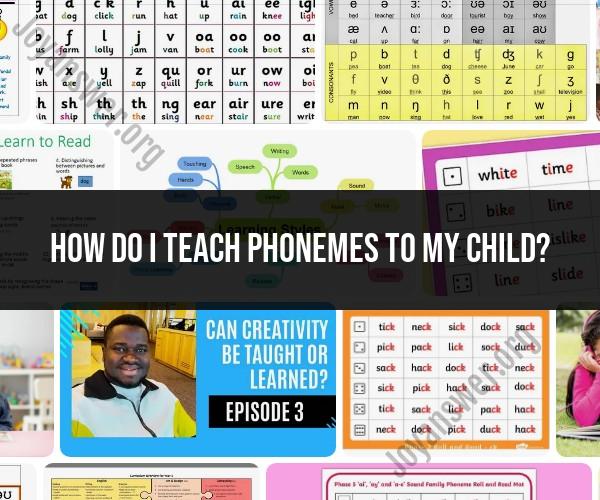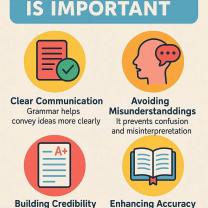How do I teach phonemes to my child?
Teaching phonemes to children is an essential part of early literacy development. Phonemes are the smallest units of sound in words and are crucial for learning to read and write. Here are some effective methods for teaching phonemes to children:
Phonemic Awareness Activities:
- Start with phonemic awareness activities that focus on the sounds of language rather than written letters. These activities can include rhyming games, clapping syllables in words, or identifying the initial sounds in words.
Phonemic Isolation:
- Teach your child to isolate individual phonemes in words. For example, you can say a word like "cat" and ask them to identify the beginning sound, middle sound, and ending sound.
Phoneme Blending:
- Practice blending phonemes together to form words. For example, you can say the sounds /c/ - /a/ - /t/ and ask your child to blend them to say the word "cat."
Phoneme Segmentation:
- Encourage your child to segment words into individual phonemes. For example, say the word "dog," and ask them to tell you the individual sounds /d/ - /o/ - /g/.
Phoneme Manipulation:
- Play games that involve changing or substituting phonemes in words. For example, you can start with the word "cat" and ask your child to change the /c/ to /b/ to make "bat."
Use Visual Aids:
- Utilize visual aids like letter tiles or flashcards to represent individual phonemes. These can help children connect the sounds to the corresponding letters.
Read Aloud Regularly:
- Reading aloud to your child is one of the most effective ways to expose them to phonemes in the context of real words. Point out the sounds in words as you read, and encourage your child to listen actively.
Word Families:
- Explore word families (e.g., -at, -og, -it) where the beginning sound is the same, and only the ending sound changes. This helps children see and hear how phonemes work in different words.
Phonics Games and Apps:
- There are numerous phonics games and apps designed to make learning phonemes fun. These interactive tools can engage children and reinforce their understanding of phonemes.
Consistent Practice:
- Be consistent with phonemic awareness activities. Short, frequent sessions are often more effective than long, infrequent ones. Make phonemic awareness a part of daily routines.
Patience and Encouragement:
- Be patient with your child's progress and provide lots of positive reinforcement. Learning phonemes is a crucial early literacy skill, and some children may progress more quickly than others.
Build on Interests:
- Use your child's interests to engage them in phonemic activities. If they love animals, for example, use animal names to practice phonemes.
Remember that every child is unique, and their pace of learning will vary. It's important to create a supportive and encouraging learning environment where your child feels comfortable exploring phonemes and developing their early literacy skills.
How can you teach phonemes to a child effectively?
Here are some tips on how to teach phonemes to a child effectively:
- Start with simple phonemes. Some phonemes, such as /s/, /m/, and /f/, are easier to produce and manipulate than others. Start with these phonemes and gradually move on to more complex phonemes.
- Make it fun and engaging. Use games, songs, and other activities to make learning phonemes fun and engaging for children.
- Be patient and consistent. It takes time and practice for children to learn phonemes. Be patient and consistent with your instruction, and provide children with plenty of opportunities to practice.
Here are some fun and interactive methods for phoneme instruction:
- Phoneme games: There are many different phoneme games that you can play with children. For example, you can play "I Spy" with phonemes, or you can play a game where children have to identify the phoneme at the beginning or end of a word.
- Phoneme songs: There are also many different phoneme songs that you can sing with children. These songs can help children to learn and remember phonemes in a fun and engaging way.
- Phoneme manipulatives: Phoneme manipulatives are objects that can be used to represent phonemes. For example, you can use magnetic letters, tiles, or beads to represent phonemes. Children can use these manipulatives to build words, segment words, and manipulate phonemes.
How does phonemic awareness contribute to reading development?
Phonemic awareness is the ability to hear and manipulate the individual sounds in words. It is an essential skill for reading development. Children who have strong phonemic awareness skills are better able to learn and remember letter-sound relationships and to decode words.
Are there resources or tools that can aid in teaching phonemes to children?
Yes, there are a number of resources and tools that can aid in teaching phonemes to children. Some examples include:
- Phonics programs: There are many different phonics programs available. These programs can provide you with a structured approach to teaching phonemes and other reading skills.
- Phoneme manipulatives: As mentioned above, phoneme manipulatives can be a helpful tool for teaching phonemes to children.
- Online resources: There are also a number of online resources that can be used to teach phonemes to children. These resources can provide you with games, songs, and other activities that you can use with children.
What is the recommended age to start teaching phonemic awareness to kids?
The recommended age to start teaching phonemic awareness to kids is around 4 years old. However, it is never too early to start exposing children to phonemes. You can start by playing simple phoneme games with children, such as rhyming games and alliteration games.
It is important to note that every child develops at their own pace. Some children may be ready to learn phonemes at a younger age, while others may need more time. Be patient and observant, and start teaching phonemes to your child when they are ready.











